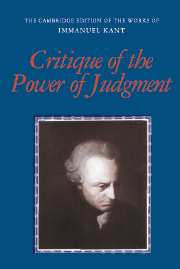Book contents
- Frontmatter
- Contents
- General editors' preface
- Editor's introduction
- First Introduction to the Critique of the Power of Judgment
- Critique of the Power of Judgment
- Preface
- Introduction
- First Part: Critique of the Aesthetic Power of Judgment
- First Section, First Book: Analytic of the Beautiful
- First Section, Second Book: Analytic of the Sublime
- Deduction of Pure Aesthetic Judgments
- Second Section: The Dialectic of the Aesthetic Power of Judgment
- Appendix: On the Methodology of Taste
- Second Part: Critique of the Teleological Power of Judgment
- Appendix: Methodology of the Teleological Power of Judgment
- Method of citation and abbreviations
- Editorial notes
- Glossary
- Index
First Section, Second Book: Analytic of the Sublime
Published online by Cambridge University Press: 05 April 2013
- Frontmatter
- Contents
- General editors' preface
- Editor's introduction
- First Introduction to the Critique of the Power of Judgment
- Critique of the Power of Judgment
- Preface
- Introduction
- First Part: Critique of the Aesthetic Power of Judgment
- First Section, First Book: Analytic of the Beautiful
- First Section, Second Book: Analytic of the Sublime
- Deduction of Pure Aesthetic Judgments
- Second Section: The Dialectic of the Aesthetic Power of Judgment
- Appendix: On the Methodology of Taste
- Second Part: Critique of the Teleological Power of Judgment
- Appendix: Methodology of the Teleological Power of Judgment
- Method of citation and abbreviations
- Editorial notes
- Glossary
- Index
Summary
Transition from the faculty for judging the beautiful to that for judging the sublime.
The beautiful coincides with the sublime in that both please for themselves. And further in that both presuppose neither a judgment of sense nor a logically determining judgment, but a judgment of reflection: consequently the satisfaction does not depend on a sensation, like that in the agreeable, nor on a determinate concept, like the satisfaction in the good; but it is nevertheless still related to concepts, although it is indeterminate which, hence the satisfaction is connected to the mere presentation or to the faculty for that, through which the faculty of presentation or the imagination is considered, in the case of a given intuition, to be in accord with the faculty of concepts of the understanding or of reason, as promoting the latter. Hence both sorts of judgments are also singular, and yet judgments that profess to be universally valid in regard to every subject, although they lay claim merely to the feeling of pleasure and not to any cognition of the object.
But notable differences between the two also strike the eye. The beautiful in nature concerns the form of the object, which consists in limitation; the sublime, by contrast, is to be found in a formless object insofar as limitlessness is represented in it, or at its instance, and yet it is also thought as a totality: so that the beautiful seems to be taken as the presentation of an indeterminate concept of the understanding, but the sublime as that of a similar concept of reason.
- Type
- Chapter
- Information
- Critique of the Power of Judgment , pp. 128 - 159Publisher: Cambridge University PressPrint publication year: 2000
- 3
- Cited by

